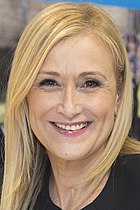 | |||||||||||||
| |||||||||||||
3,128 delegates in the national congress Plurality needed to win | |||||||||||||
|---|---|---|---|---|---|---|---|---|---|---|---|---|---|
| Opinion polls | |||||||||||||
| Turnout | 2,659 (85.0%) (president) 2,658 (85.0%) (board) | ||||||||||||
| |||||||||||||
| |||||||||||||
The 18th National Congress of the People's Party was held in Madrid from 10 to 12 February 2017, to renovate the governing bodies of the People's Party (PP) and establish the party's main lines of action and strategy for the next leadership term. [1] The congress was initially due for 2015, but the various elections held in Spain that year (local, regional and general) and the deadlock in the government formation negotiations leading up to the 2016 general election, as well as a major crisis over the issue within the opposition Spanish Socialist Workers' Party (PSOE), saw the event being delayed until early 2017. [2] [3] [4]
Contents
- Overview
- Timetable
- Candidates
- Elected
- Declined
- Opinion polls
- PP voters
- Spanish voters
- Results
- References
The congress slogan was "Spain, forward" (Spanish : España, adelante). [5] [6] It was dubbed as a "quiet" congress for incumbent party president Mariano Rajoy, who was re-elected for a fourth consecutive term in office with 95.7% of the delegate vote in the congress (2,530 votes) and 4.3% of blank ballots (115). [7] [8] It also saw the sidelining from party leadership positions of former supporters of José María Aznar, who had grown a vocal critic of Rajoy within the party in the previous years, [9] as well as the introduction of a primary system to elect the party president in future congresses; such system would see its first application in 2018. [10] [11] Other novelties included a reform of the party statutes that automatically granted to the party president the status of prime ministerial candidate in any Spanish general election held from that point onwards. [12]
The two-year delay in the congress's calling was brought to the courts by a party member, with the Supreme Court of Spain ruling it as unlawful in December 2020, as it "violated the plaintiff's right of association, in its aspect of the right of democratic participation in the party". [13]























